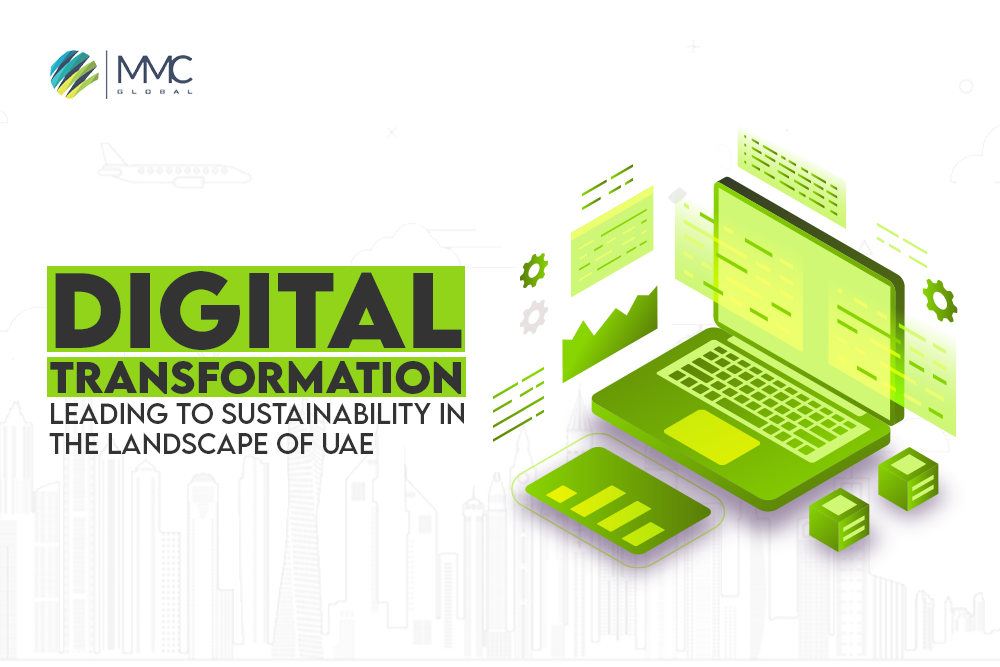Digital Transformation Leading To Sustainability In The Landscape of UAE


Digital transformation is the most on-demand key to be parallel with the innovative world. In UAE, the digital era has been hyped in every aspect that improves the living standards of the residents. The UAE government is highly active in turning traditional living standards into contemporary lifestyles with the help of digital transformation. However, the current scenario of digitalization influences and adopts sustainable practices and technologies.
From paperless work to traffic control systems and healthcare transformation and many things in between, the incorporation of digital systems expands the beauty of the UAE. This digital transformation ensures sustainability and admiringly influences our planet.
Conclusively, digital transformation aims to reduce carbon emissions, eliminate wastage, increase efficiency, expand production, and improve reporting and analytics. In this blog, you will discover how digital transformation ensures the sustainability and growth of the economy in Dubai, UAE.
The Power Of Digital Transformation With Sustainability
The integration of tech solutions helps you reduce human errors, automate the workflow, and create data-driven insight to achieve the collective goal within timelines. In addition, the emergence of digitalization strikes every corner of the UAE, including SMBs, established enterprises, and even households. AI technology and its subsets (for example, ML, deep learning, NLP, etc.) is one of the worth-mentioned technologies that has been conquering the attention of business owners.
Similarly, Blockchain is also one of the most revolutionized technologies that help secure the financial and banking sectors. There are many others like IoT, sensory technology, beacon, and other technologies that are highly instrumental for transforming business operations.
Digital transformation helps many businesses uncover the potential of technologies by integrating them into their business workflows to generate maximum revenue streams. Moreover, the aim of building digital solutions is to solve real-life problems, make predictions to avoid any possible inconvenience, allocate resources adequately, and cut down costs to provide sustainable business growth.
When we talk about sustainable digital transformation, it means we refer to sustainable technologies that will not negatively impact the environment and can stay longer in society and the economy. The digital solution handles real-world challenges by considering long-term impact without harming the ecosystem and not compromising quality and confidentiality.
Get more information: 7 Blockchain Development Practices for Implementation
Digital Transformation In UAE Landscape
Smart Cities and Infrastructure
Smart Grids
Dubai is leveraging smart grid digital transformation to enhance its energy management systems. Smart grids allow for real-time monitoring and management of energy consumption, facilitating the integration of renewable energy sources like solar and wind. This technology not only reduces energy waste but also ensures a more reliable and efficient power supply. By using advanced metering infrastructure and automated control systems, Dubai is able to optimize energy distribution and minimize losses, contributing significantly to its sustainability goals.
IoT and Sensors
The deployment of Internet of Things (IoT) devices and sensors across the city enables real-time data collection and analysis. These sensors monitor various parameters such as air quality, water levels, and energy usage. For example, smart meters installed in homes and businesses provide detailed insights into energy consumption patterns, allowing residents and authorities to make informed decisions to reduce waste and enhance efficiency. This real-time data is crucial for proactive maintenance and resource management, ensuring a more sustainable urban environment.
Smart Buildings
Dubai’s construction sector is increasingly adopting smart building technologies. These buildings are equipped with automated systems that control lighting, heating, cooling, and ventilation based on occupancy and environmental conditions. By optimizing energy use and improving indoor air quality, smart buildings significantly reduce the carbon footprint. Additionally, the use of sustainable materials and construction methods further enhances the environmental performance of these structures, aligning with Dubai’s vision of a sustainable urban future.
Renewable Energy Integration
Solar Power
One of the cornerstone projects in Dubai’s renewable energy strategy is the Mohammed bin Rashid Al Maktoum Solar Park. This large-scale solar power project harnesses advanced photovoltaic and concentrated solar power technologies to generate clean energy. Moreover, the use of cutting-edge technology ensures high efficiency and output, making solar energy a viable and significant contributor to Dubai’s energy mix. The solar park is part of the Dubai Clean Energy Strategy 2050, which aims for 75% of the city’s energy to come from clean sources by mid-century.
Energy Storage Solutions
To complement its renewable energy initiatives, Dubai is investing in advanced energy storage solutions. These Digital transformation solutions store excess energy generated during peak production times and release it when demand is high. By using batteries and other storage technologies, Dubai can ensure a stable and continuous supply of renewable energy, even when the sun isn’t shining or the wind isn’t blowing. This capability is crucial for integrating intermittent renewable energy sources into the grid and maintaining energy reliability.
Sustainable Mobility
Electric and Autonomous Vehicles
Dubai is making significant strides in promoting electric vehicles (EVs) and autonomous vehicles as part of its sustainable mobility strategy. The government offers incentives for EV purchases and is expanding the network of charging stations across the city. Additionally, autonomous vehicles are being tested and deployed to reduce traffic congestion and emissions. These vehicles use advanced sensors and AI to navigate efficiently, further contributing to a reduction in the city’s carbon footprint.
Smart Public Transportation
Dubai’s public transportation system is being transformed with the help of digital technologies. In fact, smart systems optimize bus and metro routes, reducing travel times and increasing efficiency. Real-time tracking and mobile apps provide commuters with up-to-date information, making public transport more convenient and encouraging its use over private vehicles. This shift not only reduces traffic congestion but also lowers overall emissions, supporting Dubai’s sustainability objectives.
Digitally Waste Management Control
Smart Waste Collection
Dubai is utilizing IoT-enabled waste bins and smart collection systems to improve waste management. These bins are equipped with sensors that monitor waste levels and automatically alert collection services when they need to be emptied. This system ensures efficient collection routes, reducing the number of trips required and lowering fuel consumption and emissions. Additionally, smart waste management facilitates higher recycling rates by segregating waste at the source and optimizing recycling processes.
Circular Economy
Digital platforms are playing a pivotal role in promoting a circular economy in Dubai. These platforms connect businesses and individuals, enabling the sharing, reuse, and recycling of materials and products. For example, online marketplaces for second-hand goods and materials reduce waste and encourage sustainable consumption. By fostering a culture of reuse and recycling, Dubai is moving towards a more sustainable economic model that minimizes waste and conserves resources.
Water Conservation Monitoring
Smart Irrigation Systems
Dubai is addressing water scarcity through the use of smart irrigation systems in agriculture and landscaping. These systems use sensors and data analytics to optimize water use, ensuring that plants receive the right amount of water at the right time. However, by preventing over-irrigation and reducing water waste, these technologies help conserve this precious resource. Smart irrigation is particularly important in a desert city like Dubai, where water conservation is critical for sustainability.
Water Treatment and Recycling
Advanced digital technologies are enhancing water treatment processes in Dubai. By using real-time monitoring and automation, water treatment plants can operate more efficiently and effectively. Additionally, treated wastewater is recycled for non-potable uses such as irrigation and industrial processes. This reduces the demand for fresh water and supports the city’s sustainability goals by promoting water reuse and reducing overall consumption.
Data-Driven Decision Making With Digital Transformation
Big Data and Analytics
Big data and analytics are empowering Dubai to make informed decisions regarding urban planning and resource allocation. By analyzing vast amounts of data from various sources, authorities can identify patterns and trends that inform policy-making and strategic planning. For instance, data analytics can predict energy demand, optimize traffic flow, and improve public services. This data-driven approach ensures that sustainability initiatives are targeted and effective, maximizing their impact.
AI and Machine Learning
Artificial Intelligence (AI) and machine learning technologies are being utilized to manage resources more efficiently. These technologies can predict and respond to resource needs in real time, reducing waste and improving efficiency. For example, AI algorithms can optimize energy use in buildings, predict maintenance needs for infrastructure, and enhance logistics and supply chain operations. By harnessing the power of AI, Dubai can enhance its sustainability efforts and achieve better outcomes with digital transformation strategy.
Public Engagement and Education
Digital Platforms
Digital platforms and mobile applications are essential tools for engaging the public in sustainability initiatives. These platforms provide information and resources on sustainable practices, encouraging residents to adopt environmentally friendly behaviors. For example, apps that track personal energy or water usage can motivate users to reduce consumption. Public engagement through digital means ensures widespread participation and support for sustainability efforts.
Virtual and Augmented Reality
Virtual and augmented reality technologies are being used to raise awareness and educate citizens about sustainability. These immersive digital transformation can highlight the impacts of environmental issues as well as demonstrate the benefits of sustainable practices. For example, virtual tours of renewable energy facilities or simulations of climate change scenarios can make complex topics more accessible and engaging. By leveraging these technologies, Dubai is fostering a more informed and proactive community.
Policy and Governance
E-Government Services
Dubai has implemented e-government services to streamline public administration and reduce paper use. Online services for licensing, permitting, and other government functions not only enhance efficiency but also minimize environmental impact. By reducing the need for physical documents and in-person visits, e-government services contribute to a more sustainable and efficient public sector.
Digital Regulations
The government of Dubai is actively promoting digital transformation solutions for sustainability through policies and regulations. These policies encourage the adoption of technologies that enhance environmental performance, such as energy-efficient building standards and incentives for renewable energy projects. By creating a regulatory environment that supports digital innovation, Dubai is driving progress toward its sustainability goals and positioning itself as a leader in smart, sustainable development.
In summary, digital transformation is a key enabler of sustainability in Dubai. Through the integration of advanced technologies across various sectors, Dubai is enhancing efficiency, reducing waste, and improving the quality of life for its residents. Moreover, these efforts are aligned with the city’s vision of becoming a global leader in sustainability and smart city development.
How MMC Global Helps You Transform Digitally
Digital transformation accelerates the functions and processes with higher efficiency, less human errors, and more cost-effectively. MMC Global is the universal companion for shaping the world with digital transformation solutions. From building futuristic solutions to contributing to the ever-evolving tech infrastructure, we help you integrate unwavering solutions for any industry including manufacturing, non-manufacturing, and service-based enterprises.
In fact, our major contribution to the UAE governmental sector was to build an extensive open data portal for Abu Dhabi where government bodies share data and insight about 12 major country domains, including agriculture, education, import and export sector, transport, tourism energy, economy, etc.
This platform contains a wide number of datasets of each domain where users (citizens) can access, view, and exchange data. Moreover, it helps the Abu Dhabi Government to build a safe repository to secure the country’s data and be effectively accountable to the people of the country. Abu Dhabi government appreciated our digital transformation solution as we made a product that delivers robustness, end-to-end security encryption, and higher functionality.
This is one example of our services and there are more than in the queue. If you have any challenging problem that we can solve by digital transformation, we are up to take over it. Let’s connect and turn your problems into effective solutions.



